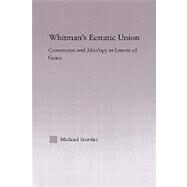- ISBN: 9780415972154 | 0415972159
- Cover: Hardcover
- Copyright: 6/10/2005
Whitman's Ecstatic Unionrereads the first three editions of Leaves of Grass within the context of a nineteenth-century antebellum evangelical culture of conversion. Though Whitman intended to write a new American Bible and "inaugurate a religion," contemporary scholarship has often ignored the religious element in his poetry. But just as evangelists sought the redemption of America through the reconstruction of individual subjects in conversion, Leaves of Grass sought to redeem the nation by inducing ecstatic, regenerating experiences in its readers.Whitman's Ecstatic Unionexplores the ecstasy of conversion as a liminal moment outside of language and culture, and-employing Althusser's model of ideological interpellation and anthropological models of religious ritual-shows how evangelicalism remade subjects by inducing ecstasy and instilling new narratives of identity. The book analyzes Whitman's historical relationship to preaching and conversion and reads the 1855 "Song of Myself" as aconversion narrative. A focus on the 1856 edition and the poem "To You" explores the sacred seductions at the heart of Whitman's poetry. "Crossing Brooklyn Ferry" and Whitman's vision of a world of perfect miracles are then connected to a conception of universal affection, uncannily paralleling Jonathan Edward's ideal of "love to being in general." A conclusion looks toward the transformations of Whitman's vision in the 1860 edition.







